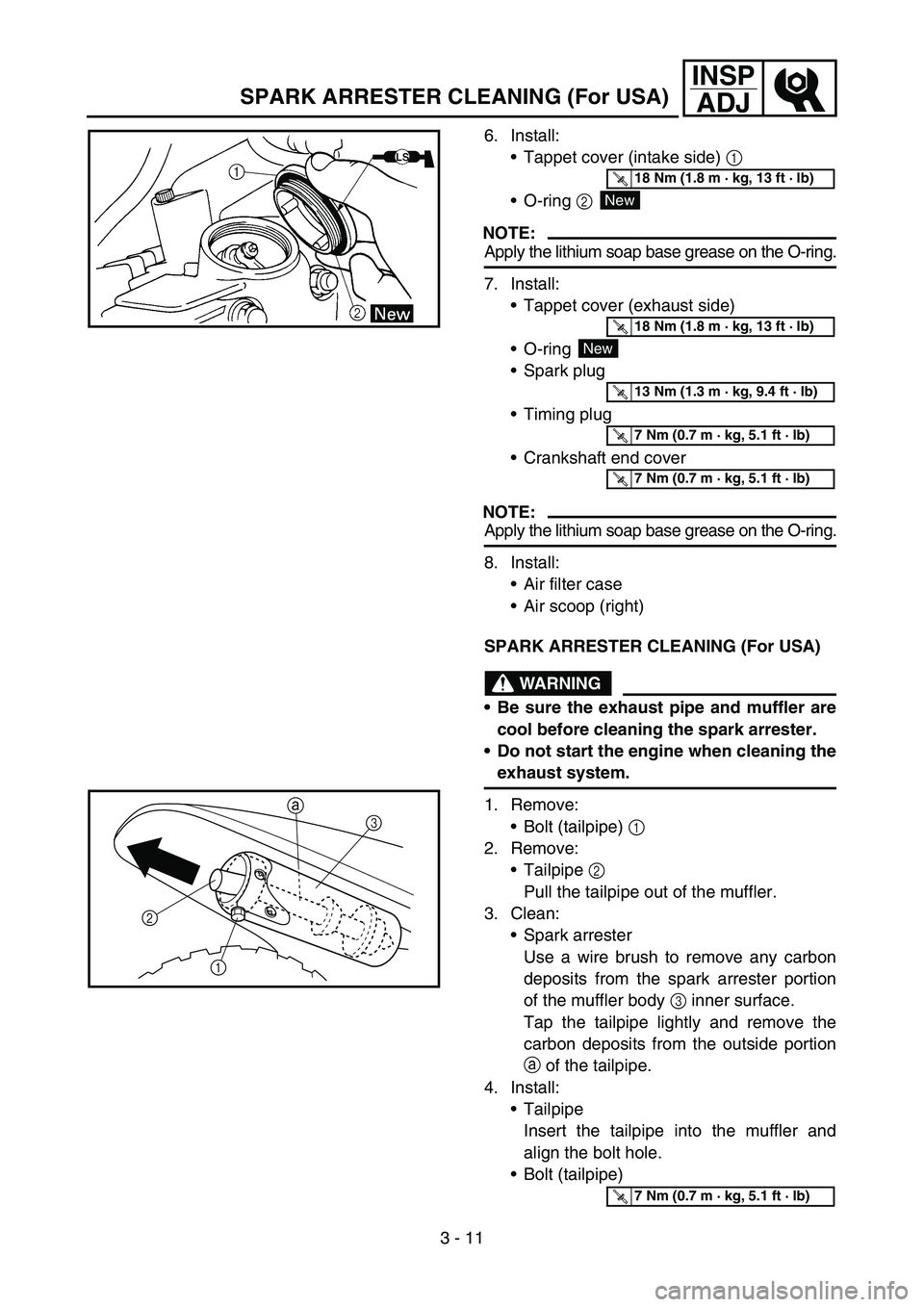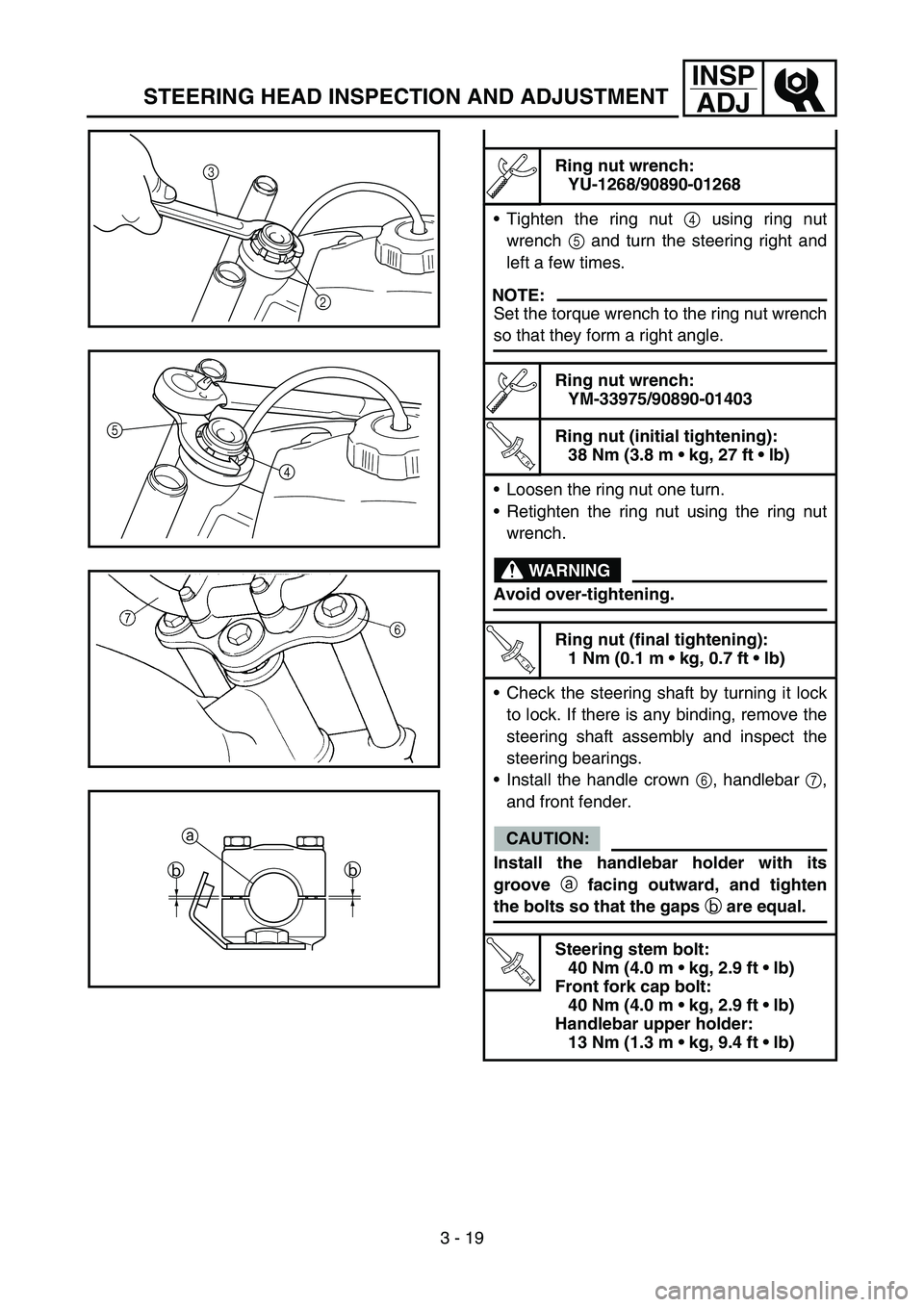Page 152 of 390

3 - 11
INSP
ADJ
SPARK ARRESTER CLEANING (For USA)
6. Install:
Tappet cover (intake side) 1
O-ring 2
NOTE:
Apply the lithium soap base grease on the O-ring.
7. Install:
Tappet cover (exhaust side)
O-ring
Spark plug
Timing plug
Crankshaft end cover
NOTE:
Apply the lithium soap base grease on the O-ring.
8. Install:
Air filter case
Air scoop (right)
SPARK ARRESTER CLEANING (For USA)
WARNING
Be sure the exhaust pipe and muffler are
cool before cleaning the spark arrester.
Do not start the engine when cleaning the
exhaust system.
1. Remove:
Bolt (tailpipe) 1
2. Remove:
Tailpipe 2
Pull the tailpipe out of the muffler.
3. Clean:
Spark arrester
Use a wire brush to remove any carbon
deposits from the spark arrester portion
of the muffler body 3 inner surface.
Tap the tailpipe lightly and remove the
carbon deposits from the outside portion
a of the tailpipe.
4. Install:
Tailpipe
Insert the tailpipe into the muffler and
align the bolt hole.
Bolt (tailpipe)
T R..18 Nm (1.8 m · kg, 13 ft · lb)
New
T R..18 Nm (1.8 m · kg, 13 ft · lb)
New
T R..13 Nm (1.3 m · kg, 9.4 ft · lb)
T R..7 Nm (0.7 m · kg, 5.1 ft · lb)
T R..7 Nm (0.7 m · kg, 5.1 ft · lb)
2
1
3
a
T R..7 Nm (0.7 m · kg, 5.1 ft · lb)
Page 168 of 390

3 - 19
INSP
ADJ
STEERING HEAD INSPECTION AND ADJUSTMENT
Ring nut wrench:
YU-1268/90890-01268
Tighten the ring nut 4 using ring nut
wrench 5 and turn the steering right and
left a few times.
NOTE:
Set the torque wrench to the ring nut wrench
so that they form a right angle.
Ring nut wrench:
YM-33975/90890-01403
T R..
Ring nut (initial tightening):
38 Nm (3.8 m kg, 27 ft lb)
Loosen the ring nut one turn.
Retighten the ring nut using the ring nut
wrench.
WARNING
Avoid over-tightening.
T R..
Ring nut (final tightening):
1 Nm (0.1 m kg, 0.7 ft lb)
Check the steering shaft by turning it lock
to lock. If there is any binding, remove the
steering shaft assembly and inspect the
steering bearings.
Install the handle crown 6, handlebar 7,
and front fender.
CAUTION:
Install the handlebar holder with its
groove
a facing outward, and tighten
the bolts so that the gaps
b are equal.
T R..
Steering stem bolt:
40 Nm (4.0 m kg, 2.9 ft lb)
Front fork cap bolt:
40 Nm (4.0 m kg, 2.9 ft lb)
Handlebar upper holder:
13 Nm (1.3 m kg, 9.4 ft lb)
5
4
2 3
a
bb
Page 170 of 390
3 - 20
INSP
ADJ
TT-R90E
Steering ring nut
Steering ring nut adjustment steps:
Remove the front fender 1.
Remove the handlebar and handle crown.
Loosen the ring nut 2 using the ring nut
wrench 3.
Ring nut wrench:
YU-1268/90890-01268
Tighten the ring nut 4 using ring nut
wrench 5 and turn the steering right and
left a few times.
NOTE:
Set the torque wrench to the ring nut wrench
so that they form a right angle.
Ring nut wrench:
YM-33975/90890-01403
T R..
Ring nut (initial tightening):
38 Nm (3.8 m kg, 27 ft lb)
Loosen the ring nut one turn.
Retighten the ring nut using the ring nut
wrench.
WARNING
Avoid over-tightening.
T R..
Ring nut (final tightening):
1 Nm (0.1 m kg, 0.7 ft lb)
Check the steering shaft by turning it lock
to lock. If there is any binding, remove the
steering shaft assembly and inspect the
steering bearings.
Install the handle crown 6, main switch
7, handlebar 8, and front fender.
2 3
5
4
8
7
6
STEERING HEAD INSPECTION AND ADJUSTMENT
Page 178 of 390

3 - 24
INSP
ADJ
BATTERY INSPECTION AND CHARGING
(TT-R90E)
WARNING
Batteries generate explosive hydrogen gas
and contain electrolyte which is made of
poisonous and highly caustic sulfuric acid.
Therefore, always follow these preventive
measures:
Wear protective eye gear when handling
or working near batteries.
Charge batteries in a well-ventilated area.
Keep batteries away from fire, sparks or
open flames (e.g., welding equipment,
lighted cigarettes).
DO NOT SMOKE when charging or han-
dling batteries.
KEEP BATTERIES AND ELECTROLYTE
OUT OF REACH OF CHILDREN.
Avoid bodily contact with electrolyte as it
can cause severe burns or permanent eye
injury.
FIRST AID IN CASE OF BODILY CONTACT:
EXTERNAL
Skin — Wash with water.
Eyes — Flush with water for 15 minutes
and get immediate medical attention.
INTERNAL
Drink large quantities of water or milk fol-
lowed with milk of magnesia, beaten egg
or vegetable oil. Get immediate medical
attention.
CAUTION:
Charging time, charging amperage and
charging voltage for an MF battery are dif-
ferent from those of conventional batteries.
The MF battery should be charged as
explained in the charging method illustra-
tions. If the battery is overcharged, the
electrolyte level will drop considerably.
Therefore, take special care when charging
the battery.
BATTERY INSPECTION AND CHARGING (TT-R90E)
Page 182 of 390

3 - 26
INSP
ADJ
BATTERY INSPECTION AND CHARGING (TT-R90E)
ÈRelationship between the open-circuit voltage
and the charging time at 20 °C (68 °F)
(These values vary with the temperature, the
condition of the battery plates, and the electro-
lyte level.)
ÉOpen-circuit voltage
ÊCharging time (hours)
ËTime (minutes)
ÌCharging condition of the battery
ÍAmbient temperature 20 °C (68 °F)
aCharging
bCheck the open-circuit voltage.
Check the charge of the battery, as shown
in the charts and the following example.
Example:
Open-circuit voltage = 12.0 V
Charging time = 6.5 hours
Charge of the battery = 20 ~ 30% È
5. Charge:
Battery
(refer to the appropriate charging method
illustration)
WARNING
Do not quick charge a battery.
CAUTION:
Never remove the MF battery sealing
caps.
Do not use a high-rate battery charger
since it forces a high-amperage current
into the battery quickly and can cause
battery overheating and battery plate
damage.
If it is impossible to regulate the charging
current on the battery charger, be careful
not to overcharge the battery.
When charging a battery, be sure to
remove it from the machine. (If charging
has to be done with the battery mounted
on the machine, disconnect the negative
battery lead from the battery terminal.)
To reduce the chance of sparks, do not
plug in the battery charger until the bat-
tery charger leads are connected to the
battery.
Page 194 of 390
3 - 31
INSP
ADJ
FUSE INSPECTION (TT-R90E)
3. Replace:
Blown fuse
WARNING
Never use a fuse with an amperage rating
other than that specified. Improvising or
using a fuse with the wrong amperage rat-
ing may cause extensive damage to the
electrical system, cause the starting and
ignition systems to malfunction and could
possibly cause a fire.
4. Install:
Rear fender
Seat Replacement steps:
Set the main switch to “OFF”.
Install a new fuse of the correct amperage.
Set on the switches to verify if the electri-
cal circuit is operational.
If the fuse immediately blows again, check
the electrical circuit.
ItemsAmperage
ratingQ’ty
Main fuse 10 A 1
Page 206 of 390
4 - 6
ENGCARBURETOR
EC464600
Float
1. Inspect:
Float 1
Damage → Replace.
ASSEMBLY AND INSTALLATION
Carburetor
1. Install:
Pilot air screw 1
Note the following installation points:
Screw in the pilot air screw until it is lightly
seated.
Back out it by the specified number of
turns.
Pilot air screw:
1-3/4 turns out
2. Install:
Throttle valve 1
Starter plunger 2
NOTE:
Align the slit a of the throttle valve with the tab
b of the carburetor top.
FUEL LEVEL ADJUSTMENT
WARNING
Gasoline (fuel) and its vapors are highly
flammable and explosive. Keep away from
sparks, cigarettes, flames or other sources
of ignition.
Page 296 of 390
5 - 1
CHAS
EC500000
CHASSIS
FRONT WHEEL AND REAR WHEEL
FRONT WHEEL AND FRONT BRAKE
Extent of removal:
1 Front wheel removal
2 Wheel bearing removal
3 Brake shoe plate assembly removal and disassembly
Extent of removal Order Part name Q’ty Remarks
FRONT WHEEL REMOVAL
WARNING
Support the machine securely so
there is no danger of it falling over. Preparation for removal Hold the machine by placing the
suitable stand under the engine.
1 Bolt (brake cable holder) 1 Only loosening.
2 Brake cable 1 Disconnect at the lever side.
3 Wheel axle nut 1
4 Front wheel axle 1
5 Front wheel 1
6 Collar set 1
7 Brake shoe plate assembly 1
8 Oil seal 1
9 Bearing 2 Refer to “REMOVAL POINTS”.
2
13
3
FRONT WHEEL AND REAR WHEEL